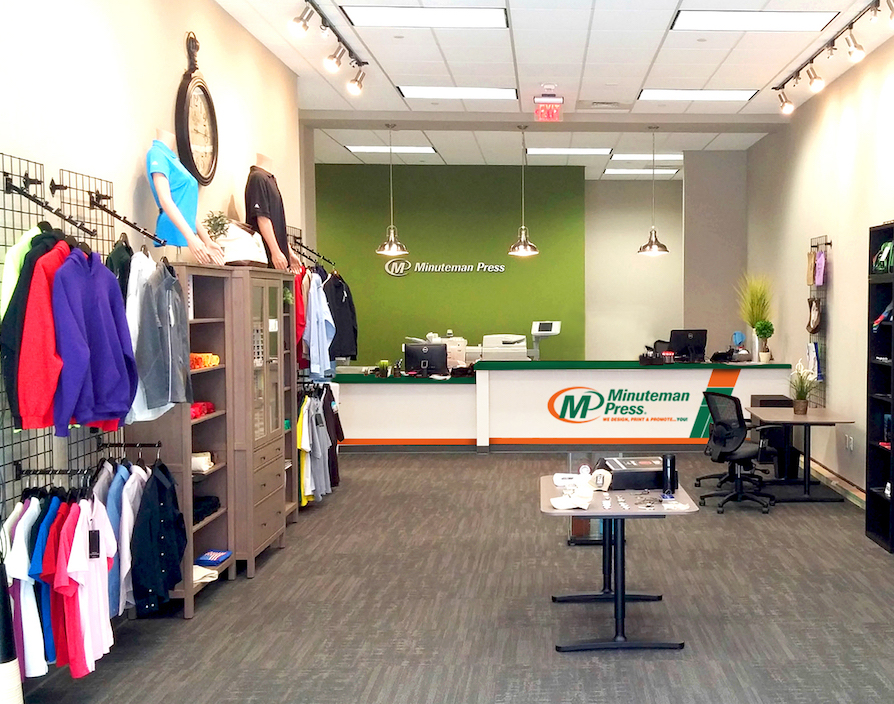The business world was a very different place in the 1970s. There were no social networks or smartphones through which to spread corporate messages and win customers. This is something Bob Titus, the president and CEO of Minuteman Press, the New York-headquartered marketing services franchise, knows well, having been there when the business first started with his father Roy. Aged 21 in 1973 when the first centre opened, Bob Titus says: “The vision was just to run a successful business and expand it to have our own chain.” Little did he know that dream would eventually make Minuteman a global tour de force with around 1,000 franchises worldwide. And while growth happened relatively quickly, it didn’t happen overnight – at least not until the team revised its strategy.
Minuteman’s approach to business was passive in the beginning, explains Titus, trusting the signage in the window to be enough to get people through the door. With a slow start for the first couple of months, a marketing programme was drawn up and it’s still used almost 50 years later. “We went out and visited people and told them ‘we’re here, here’s what we do, what we can help you with?'” Although it sounds simple, nobody was doing this at the time so it was unheard of. Titus says the public was generally left to to track down printers, so the move paid off. “We started going to the businesspeople and bringing in work every day,” he recalls. “We hired a couple of part-timers and they went out and brought all kinds of samples back for us to quote on and we took off like a rocket.” Offering insight on what’s expected of franchisees, Titus says: “We still use that marketing approach today, that’s what our owners have to do – go out, meet people in the community, get involved in clubs and organisations and be a pillar of society if you will.””
While the internet today is used to Minuteman’s advantage, Titus still feels nothing comes close to face-to-face meetings. “You still can’t beat eyeball-to-eyeball contact. There’s nothing better than going out and talking to people. Our thinking is when you have a business, you’re excited about it, so tell everybody who’ll listen.” With this game-changing approach working wonders, three centres were opened within two years – and the second broke even the first month. Each site was around three miles apart but serving different communities, including blue collar, white collar and a combination of the two, which gave Minuteman access to local businesses as well as office buildings.
Confident in its proposition and performance when 1975 rolled around, Minuteman plunged into franchising, believing it would be a quicker way to expand the company. The team attended a New York franchise show with a plan to conquer the tri-state area, so a manager from one of the three nearby centres would be able to drive out and offer support when needed. “We believed totally in supporting the people,” says Titus. “The franchise makes money on a royalty fee, so we figured the more we worked with people and pushed them to do the right thing, the more money they’ll make and more money we’ll make.” The franchise show in the Big Apple made it apparent that the business had more interest further afield than on the doorstep, however, meaning that driving distance support plan went out the window. “At the first show, one gentleman wanted to open in Boston and another in San Diego,” Titus laughs. “We just said ‘slow down you guys’ and my dad said ‘I’m not putting one of these guys on a plane to go help you print for a day in California, it’s not going to happen’. But they were really persistent.”
In the end Minuteman opened centres across the US, recalls Titus, using contacts from his father’s earlier publishing career to helm them. This provided the franchise the foundation it would need to support franchisees further afield. “We said ‘you open a company store in Boston, get a press operator, build the store up and when you’re profitable, you can put people into business in the New England area’. We did this in six different cities across America. We got the support there first.” This model proved so successful that, to prioritise franchisees, all company-owned centres were sold aside from two on Long Island, which were retained for training purposes. By the mid-1990s Minuteman had almost 700 US locations and was running out of space and that’s when the UK caught its eye.
Discussing the reason for crossing the pond in 1995, Titus half-jokes: “We thought, ‘there are different meanings for some words but hey we understand each other’. All US franchise magazines were promoting going to the UK and franchising in the UK.” Building on that, he says: “We were looking at UK magazines and statistics were largely the same as the US. Numbers were a bit smaller but percentage-wise it was all the same thing and we said ‘let’s go’.”
The first step for Minuteman was to open a UK office and then US representatives visited a local franchise show to get things moving in hope it would work as well as it did in New York. Explaining the pitching process, Titus says: “Everything was like ‘we’re hoping to do this’. Because when you have nothing to show, there’s nothing there. So the first couple of people really got extra support, I’ll tell you,” he laughs.
Today the UK operation is a slick part of the overall Minuteman empire, with 70 centres nationwide, which are supported with franchisee officers up and down the country in areas including Scotland, Manchester and London. It wasn’t all as straightforward though. While Americans are traditionally known for being outspoken, we Brits are typically more reserved. “There were different philosophies,” says Titus. “It was a lot harder to get the majority of the people out marketing with our way to go and say hello.” But some of those who came aboard in the early days are still operational now, with ten original franchisees that joined in 1995 and 1996 still up and running. One franchisee in Poole is now even second generation, as the daughter of an original owner has taken over following her father’s retirement. And across Minuteman’s network on the whole, 100 centres are second generation-owned.
With the UK conquered, the franchisor also set out to open in South Africa and Australia and both markets today are a similar size to that of Britain. All new franchisees are required to take a trip to the New York centres to get brought up to speed while the leadership team gets to know them because it’s important to Titus that everyone understands the philosophy of Minuteman.
And while the business has evolved with the times, adding SEO, SEM and other digital services to its printing roots, that philosophy is still very much intact. “Your franchise is only as good as the people you put into the business,” he says. “That’s the most important thing in franchising that some people don’t understand or realise. If you put good people into business you have a good company – you put bad people in you get a bad company. And we run a good one.””

Zen Terrelonge
As editor, Terrelonge can be found on the hunt for all things startup and scaleup - that's when he's not busy talking babies via DADult Life. Whether it's health or hospitality, food or philanthropy, tech or travel, he'll be seeking out the most interesting entrepreneurial developments to run in the magazine and online.

Zen Terrelonge
As editor, Terrelonge can be found on the hunt for all things startup and scaleup - that's when he's not busy talking babies via DADult Life. Whether it's health or hospitality, food or philanthropy, tech or travel, he'll be seeking out the most interesting entrepreneurial developments to run in the magazine and online.


































